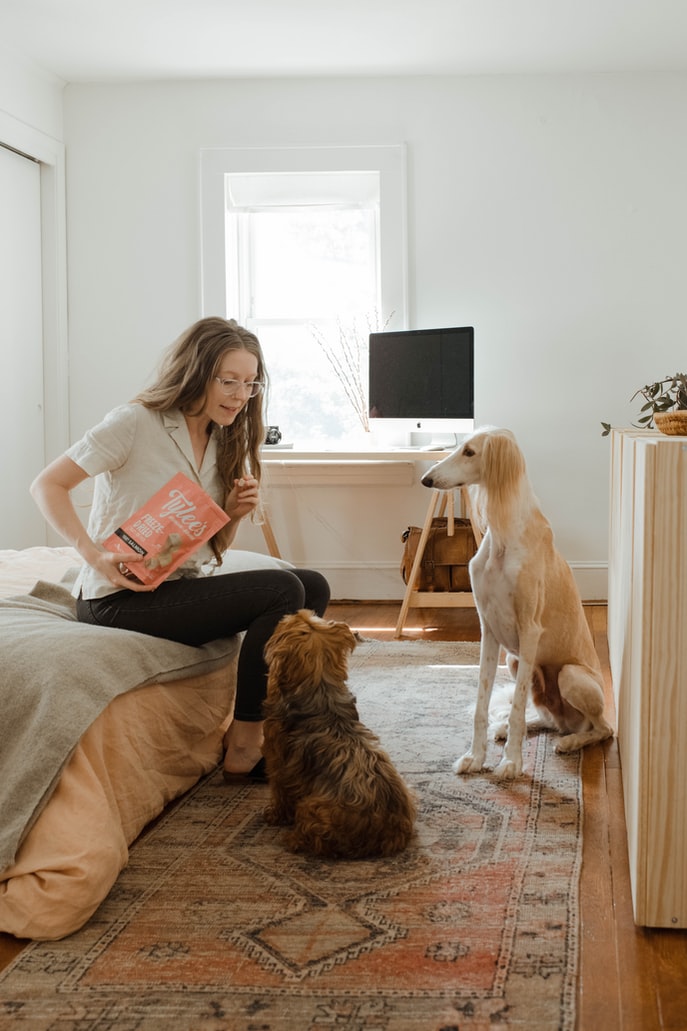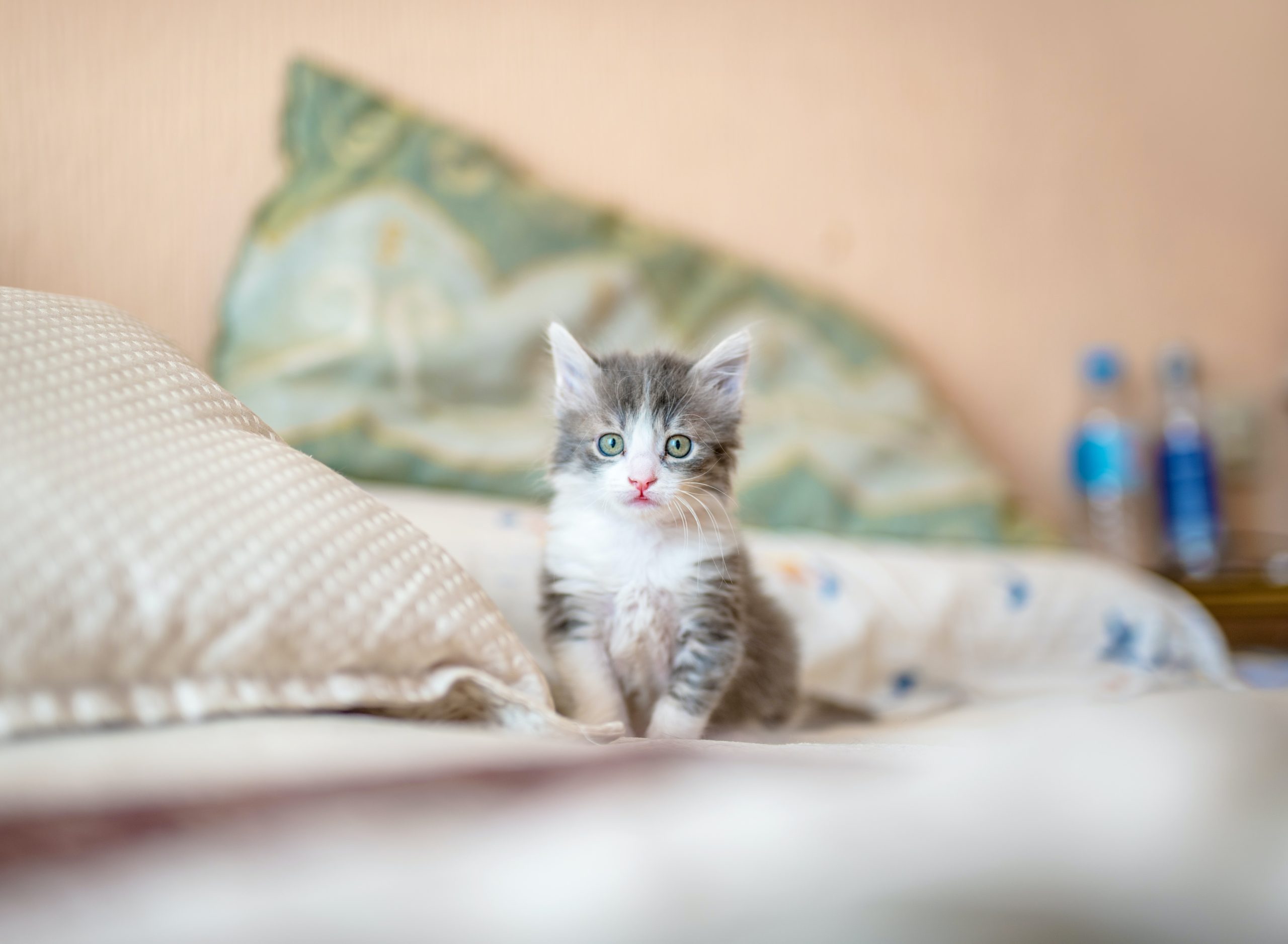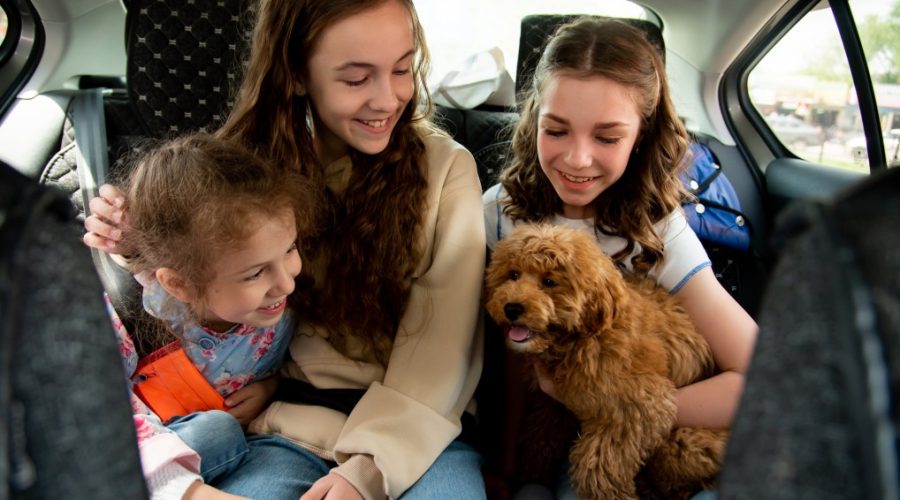The first night with a new kitten or puppy is a very exciting time. We want cuddles and kisses and we want them now! But we often forget one important thing – our new pets have just been separated from their mum and siblings and brought into a new world filled with unfamiliar sights and scents.
Puppies and kittens are undoubtedly anxious and afraid when confronted with unfamiliar people, animals and environments and will often cry for most of the night. This is completely normal and is a natural reaction designed to protect them from potential harm. That is why it’s important to ensure your new puppy or kitten is as comfortable as possible so they can learn to cope with new situations and become more confident well-rounded animals!
The most important tip is to be patient! It can take some time for both you and your new furry friend to adjust to each other and for your pet to learn to trust you. So, if you’ve just decided to add a new member to your family, we have put together a few tips and tricks to help you get them settled into their new home.

First Night Home with a Kitten
Most kittens can be separated from their mothers after they have turned 8 weeks old. This is the most appropriate age as it allows kittens to have received enough nutrition and socialisation from their mother and siblings. Similarly, by 8 weeks old, kittens are typically weened from their mother’s milk and will begin the transition to solid food, making them more independent and ready to adapt to their new home environment.
However, most young kittens find new and strange places scary. With careful preparation and thoughtful consideration of your kitten’s needs, you can help ease their transition into their new environment and ensure a positive experience for both you and your furry companion.
1. Give Them Space
For the first night, it is important to make sure you have set up a calm, quiet and inviting environment to help them feel secure in their new surroundings.
The best places would be laundry or bathroom rooms fitted with a comfortable bed and a lot of blankets. Additionally, placing a cat carrier or basket in the space will provide them with an enclosed space for your kitten to feel secure in.
As hard as it might be, you should resist the urge to let your new pet in the bed with you. You don’t want any devastating accidents to occur during the night! Instead, you should set up a sleeping area in a safe room within the home and begin establishing routines such as regular mealtimes.
2. Familiar Comfort Items
It is also recommended to bring your kitten home with some bedding or a soft toy or blanket. This is a familiar object that smells like home and will help comfort them on their first night.
It is also completely normal for kittens to cry on their first few nights in their new home. If this is the case, a good idea is to warm up a blanket to mimic the warmth they would get from their mother so that they feel more at home.
3, Food, Water, and Litter
When it comes to food and water, it is best to have small bowls of food and water placed a small distance apart (cats don’t like their food right next to their water!) and, of course, a litter tray. For the first few meals, it is best to feed your kitten with the same food they are used to as a sudden change of diet combined with the stress of adapting to a new home can cause stomach upsets and diarrhoea.
Once the kitten has investigated and found them all, it’s safe to leave the room for a while. It is common for your kitten to show little interest in eating or drinking so don’t worry, they will soon get used to their new surroundings and tuck in! However, if your kitten continues to show little interest in their food and water, be sure to check in with your local vet!
4. Limit Outdoor Exposure
Kittens, especially those who haven’t completed their vaccinations, are particularly vulnerable to a range of infectious diseases and illnesses commonly found in the outdoor environment.
Kittens receive a series of vaccinations starting at around 6 to 8 weeks of age to build immunity against common feline diseases. However, this immunity is not fully established until they have completed the entire vaccination series, typically by around 16 weeks of age. Until then, it is best to keep your furry companion indoors.
5. Play, Play, Play!
As your kitten begins to warm to you and their surroundings, they will begin to explore and engage more. Play is one of the best ways for you to get to know and trust each other. Not only is this a bonding experience, but allows your kitten to learn how to interpret body language, communicate their needs and desires, and engage in positive behaviours. Additionally, playtime helps kittens burn off excess energy, maintain a healthy weight, and hone their agility and coordination skills.

First Night Home with a Puppy
Puppies can be adopted after they’ve reached the 8-week mark. This age is generally equivalent to a 14-month-old baby! So, needless to say, they need a lot of extra care.
1. Preparing For Your New Pup
During the first few weeks, it is a good idea to set up a crate as a temporary bed and line it with lots of blankets and toys. This will be an area they can go and take naps and relax in when they want a bit of alone time. It is important to know that this is the puppy’s safe space and to leave them alone when they are in it.
2. Stay Close!
Dogs are social creatures and you should never isolate your puppy. Instead, position their crate in a public space, such as near your bed or in the hallway. You may be tempted to keep them in their own space when they start to cry and howl, but complete isolation at such a young age can have a detrimental effect on their anxiety and behaviour. Although you might lose sleep for a few nights, bonding with your new pup is crucial for their development.
3. The Importance Of Vaccination
Puppies, especially those who have not completed their vaccination series, are highly susceptible to a range of infectious diseases. Common threats include parvovirus, distemper, and canine influenza, which can spread rapidly in public areas, such as parks, sidewalks and dog parks. These diseases can be severe, costly to treat, and even fatal in unvaccinated puppies. By keeping up to date with your companion’s vaccinations will keep your pup against these life-threatening illnesses while also preventing the spread to other unprotected pets.
4. Keep A Piece of “Home”
Bringing a familiar object home with your new puppy can greatly help them transition to their new environment. Whether it’s a favourite toy, a cozy blanket, or an item of clothing, having something with familiar scents from their previous surroundings can provide a sense of comfort and security.
The familiar scent of home helps to ease any anxiety or stress your puppy may experience in their new surroundings, making them feel more at ease and settled in their new home. This simple act can go a long way in helping your puppy adjust to their new environment and feel safe and secure!
5. Don’t Forget Playtime!
As with kittens, playtime is crucial for your puppy’s development! It strengthens your bond and fosters physical, mental, and emotional growth. Through interactive play, your puppy gets the exercise they need to stay mentally and physically healthy.
- Provides mental stimulation, helping them learn problem-solving skills and preventing boredom
- Socialisation during play teaches them how to interact with other dogs and people
- It’s a great way to channel their energy positively and prevent destructive behaviors
- Incorporating training into playtime makes learning fun and reinforces good behaviour.

Toilet Training: Why You Should Start Early
Now is the fun part… Toilet training!
Toilet Training Kittens
A good tip for toilet training your kitten is to use the same brand of kitty litter that was used at their first home. Any familiar scents are a bonus, and this just might speed up the toilet training process.
Be sure to show your kitten where the litter box is by placing them on the tray after sleep and meals. Once they’ve used the tray for the first time, it is a good idea to leave their droppings there for the first 24 hours. This will help them recognise where to continue toileting in the future.
Toilet Training Puppies
For puppies, it is highly likely they will go where and when they need to go for the first few weeks. But this doesn’t mean you can’t start toilet training early! When you notice any toilet needing behaviour, quickly take them outside on a leash and let them go in the garden. The earlier you start, the sooner they will catch on and the fewer accidents you’ll be cleaning!
When you bring your new puppy home, take them to their designated “potty spot” as soon as possible. This helps establish a potty training routine from the get-go. Puppies need to go every two hours at minimum, and immediately after eating or drinking, sleeping or playing. When they do their business, be sure to praise them! Remember, accidents happen, but the more you focus on the positive, the quicker they will learn!
Soothing a crying kitten or puppy
As with any new addition to the family, there will be moments of adjustment, especially during the first few nights. As they grow, your puppy or kitten will express their needs and feelings through vocal sounds Understanding this behaviour and addressing their developmental and nutritional needs can help decipher why they’re crying.
Teething
One common reason for crying in young pets is teething. While this process isn’t necessarily painful, it can lead to irritability and sensitivity. (Keep an eye out for red, swollen gums with discharge, which may indicate a more serious issue that requires veterinary attention.)
To ease teething discomfort, provide safe chew toys or wet washcloths for your pet to gnaw on. Additionally, gently wiping your kitten’s teeth with a damp cloth can help soothe their gums and acclimate them to oral care routines.
Their First Night
As you settle your puppy or kitten in for their first night alone, remember that this is a big change for them! It’s natural for them to feel a little anxious, leading to some crying. To help them feel safe and secure, consider placing a hot water bottle in their bed, covered with a soft blanket. Just ensure the water is warm, not boiling, to prevent any accidents or burns. Some puppies and kittens may respond well to background white noise, which can mimic the comforting sounds of their littermates.
Don’t hesitate to offer reassurance and comfort during this transition period. Your presence and soothing words can make all the difference in helping your new furry friend feel at ease. This can even help strengthen your bond!

Give Your New Addition The Best Start
Bringing home a new kitten or puppy is an exciting time! But it’s important to be prepared for the challenges that come along with it. By following the tips in this article, you can help make sure that your new pet has a smooth transition into their forever home.
If you are looking for advice on what to do when you first bring your new kitten or puppy home, The House Call Vet is here to help! Our team of professional and experienced veterinarians can provide you with the advice and guidance you need to ensure that your new pet is healthy and happy.
However, beyond the first night, the ongoing commitment to your pet’s health is important! Regular checkups and vaccinations play a crucial role in keeping your newest addition happy and healthy. These preventive measures not only detect and address potential health issues early on but also contribute to the overall happiness and health of your pet.
We are proud to offer an extensive range of services. From dental care and desexing to at home checkups and after-hours care, we’ve got your pet covered! Book your appointment today!

